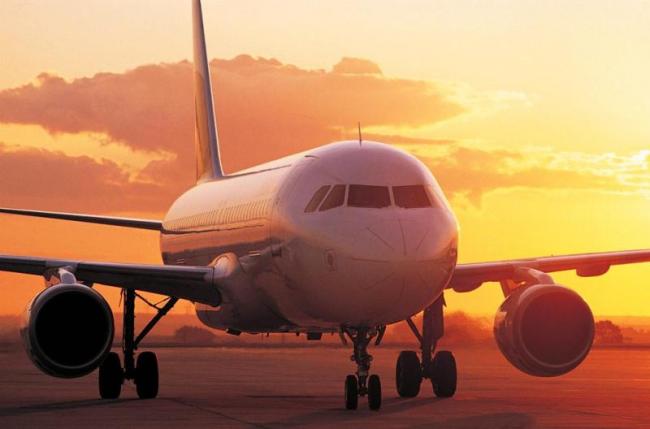
Surging heat may limit aircraft takeoffs globally, says study
During the hottest parts of the day, 10 to 30 percent of fully loaded planes may have to remove some fuel, cargo or passengers, or else wait for cooler hours to fly, the study concludes. The study, which is the first such global analysis, appears today in the journal Climatic Change.
“Our results suggest that weight restriction may impose a non-trivial cost on airline and impact aviation operations around the world,” said lead author Ethan Coffel, a Columbia University PhD. student.
As air warms, it spreads out, and its density declines. In thinner air, wings generate less lift as a plane races along a runway. Thus, depending on aircraft model, runway length and other factors, at some point a packed plane may be unable to take off safely if the temperature gets too high. Weight must be dumped, or else the flight delayed or canceled.
Average global temperatures have gone up nearly 1 degree Centigrade (1.8 Fahrenheit) since about 1980, and this may already be having an effect. In late June, American Airlines canceled more than 40 flights out of Phoenix, Ariz., when daytime highs of nearly 120 degrees made it too hot for smaller regional jets to take off. Worldwide, average temperatures are expected to go up as much as another 3 degrees C (5.4 degrees F) by 2100. But that is only part of the story; heat waves will probably become more prevalent, with annual maximum daily temperatures at airports worldwide projected to go up 4 to 8 degrees C (7.2 to 14.4 F) by 2080, according to the study. It is these heat waves that may produce the most problems.
“This points to the unexplored risks of changing climate on aviation,” said coauthor Radley Horton, a climatologist at Columbia University’s Lamont-Doherty Earth Observatory. “As the world gets more connected and aviation grows, there may be substantial potential for cascading effects, economic and otherwise.” Most studies so far have focused on how aviation may affect global warming (aircraft comprise about 2 percent of global greenhouse-gas emissions), not vice versa. But a handful of studies have warned that warming climate may increase dangerous turbulence along major air routes, and head winds that could lengthen travel times. Rising sea levels are already threatening to swamp some major airports. Coffel and Horton may be the only ones so far to look at takeoffs.
In 2015, they published a smaller-scale paper, predicting up to four times more future temperature-related takeoff problems for the common Boeing 737-800 at Phoenix, as well as Denver, New York’s LaGuardia and Washington’s Ronald Reagan. The new study projects effects on a wide range of jets at these, plus 15 of the other busiest airports in the United States, Europe, the Mideast, China and south Asia.
The authors estimate that if globe-warming emission continue unabated, fuel capacities and payload weights will have to be reduced by as much as 4 percent on the hottest days for some aircraft. If the world somehow manages to sharply reduce carbon emissions soon, such reductions may amount to as little as 0.5 percent, they say. Either figure is significant in an industry that operates on thin profit margins. For an average aircraft operating today, a 4 percent weight reduction would mean roughly 12 or 13 fewer passengers on an average 160-seat craft. This does not count the major logistical and economic effects of delays and cancellations that can instantly ripple from one air hub to another, said Horton.
Some aircraft with lower temperature tolerances will far worse than others, and certain airports—those with shorter runways, in hotter parts of the world or at higher elevations, where the air is already thinner–will suffer more. For instance, facing LaGuardia’s short runways, a Boeing 737-800 may have to offload weight half the time during the hottest days. Dubai, in the United Arab Emirates, might be worse; its runways are long, but its temperatures are already very high. Airports probably less affected because they are in temperate regions and have long runways include New York’s JFK, London Heathrow and Paris’s Charles de Gaulle.
Horton said that some effects could be mitigated with new engine or body designs, or expanded runways. But modifications would come at a cost, as aircraft are already highly engineered for efficiency; and expanded runways in densely packed cities such as New York are not an option. “The sooner climate can be incorporated into mid- and long-range plans, the more effective adaptation efforts can be,” said Coffel.
Support Our Journalism
We cannot do without you.. your contribution supports unbiased journalism
IBNS is not driven by any ism- not wokeism, not racism, not skewed secularism, not hyper right-wing or left liberal ideals, nor by any hardline religious beliefs or hyper nationalism. We want to serve you good old objective news, as they are. We do not judge or preach. We let people decide for themselves. We only try to present factual and well-sourced news.







